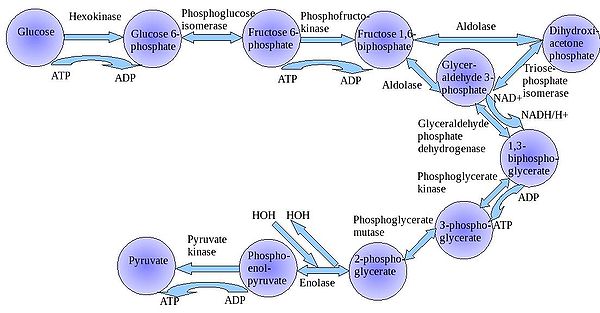I'm somewhat confused about this whole "muscle into carbs" approach. Muscle can be broken down into base amino acids, and the carbon backbone (kinda quoting wikipedia here since I'm not familiar with protein catabolism) can be converted into acetyl-CoA, a major molecule in the Krebs cycle.
Here's what confuses me: the krebs cycle is aerobic. This is something which can have its needs fulfilled by fat. I don't see why, if the body has fat, it would go through the complex process of dismantling our muscle and its amino acids when, while fat may be slower than glucose/glycogen to metabolize, it seems faster than breaking down muscle.
So, WOULD muscle actually break down to fuel anaerobic energy demands? Or would we simply get tired and be unable to perform them and be forced by that tiredness to do lower-intensity aerobic work after hitting that wall?
Perhaps the approach of the catabolic conspiracy theorists is that even if muscle does not break down in the midst of exercise, depleting a lot of glycogen via exercise would make the body go all "oh my! I have no sugar in my muscles, perhaps I should destroy the muscles to make sugar to store in them! Yes!"
It's not the most convincing idea either though. First off, as the body is metabolizing stored triglycerides, the glycerol center is converted by the liver into glyceraldehyde 3-phosphate. It can then either enter glycolysis
or gluconeogenesis (turn into glycogen), presumably stored in liver rather than muscles, much like expelled lactate, but if the muscles are starving for glucose, they can take it from the bloodstream, and the liver's stored glycogen can be released into the blood stream to spike it, so inevitably I believe it may get where it is needed to go.
So besides that source of sugar that is a byproduct of intense fat-burning exercise (which I believed happens when you work near maximal threshhold, because the body is depleting carbs anaerobically meaning it will probably start to prefer to use fats increasedly for aerobic fuel), what else?
Well, there are ketone bodies. Often used for lipid synthesis in brain, they can also be used for fuel during low-glucose times. The period of low blood sugar we experienced during exercise may be too brief for this to occur though, I don't know how long it takes to begin the fuel switchover since brain normally uses glucose.
Ultimately though, before our muscle is broken down for base aminos I think our amino acid pool (circulating free aminos used for repair or whatever) would need to be eaten up, so what we need to look at first is when and why this would happen.
Clearly it does happen with marathon runners and the like, but they don't have much body fat on them. Does muscle breakdown occur as easily with those of us with profound and plentiful fat stores, or could the body perhaps be more prone to using that?
|
|
-
04-12-2011, 11:51 AM #31


Similar Threads
-
what should my heart rate be at to make sure i'm only burning fat and not muscle afte
By mattlew62 in forum Losing FatReplies: 37Last Post: 06-29-2012, 04:06 PM -
What should my heart rate be during my cardio?
By LiftHardOrDie22 in forum Workout ProgramsReplies: 8Last Post: 12-03-2009, 10:59 AM -
what heart rate optimal for fat loss?
By HeartofaLion in forum Losing FatReplies: 4Last Post: 07-17-2009, 08:37 PM -
What Should My Heart Rate Be At For Cardio?
By Hav0c in forum NutritionReplies: 9Last Post: 11-02-2008, 01:56 AM -
Heart Rate for Fat Loss during Cardio?
By PhxJosh in forum ExercisesReplies: 4Last Post: 06-13-2008, 05:49 AM















Bookmarks